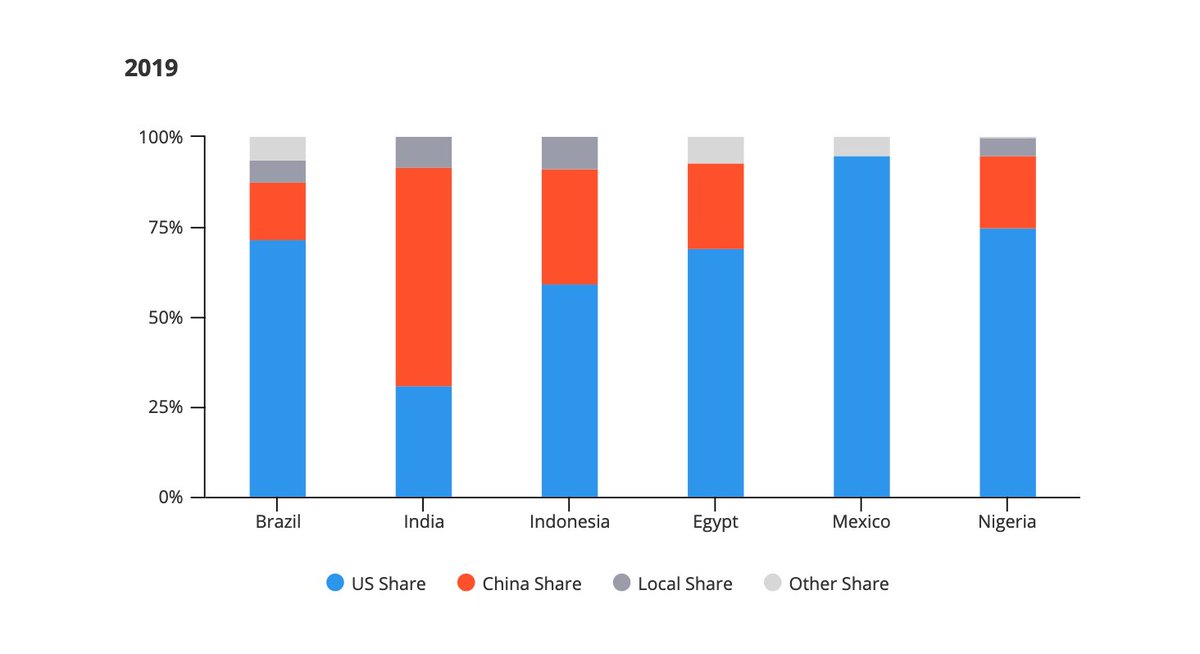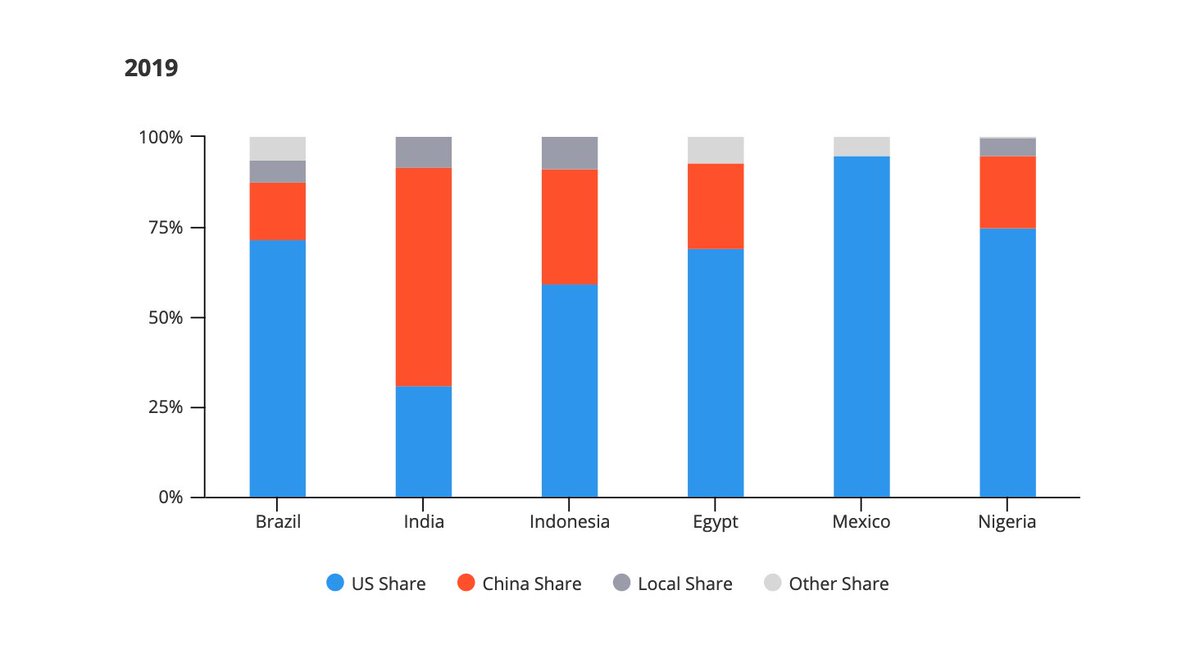
🧵 China has been rolling out lots of new AI governance measures that will reshape 🇨🇳 AI & make waves around the 🌏.
It’s easy to lose the governance forest for policy trees, so I broke down 3 key initiatives, showing how they'll compete & converge. (1/x)
carnegieendowment.org/2022/01/04/chi…
It’s easy to lose the governance forest for policy trees, so I broke down 3 key initiatives, showing how they'll compete & converge. (1/x)
carnegieendowment.org/2022/01/04/chi…
China’s widespread abuse of AI surveillance tech leads many to dismiss any governance moves there. But that risks being a huge strategic oversight.
Anyone who wants to compete against, cooperate with, or simply understand Chinese AI must examine these moves closely. (2/x)
Anyone who wants to compete against, cooperate with, or simply understand Chinese AI must examine these moves closely. (2/x)
In 2021, we saw 3 approaches to AI governance emerge. They come from different parts of the Chinese bureaucracy, and have different levels of maturity.
These approaches will compete for endorsement from top leaders, but they also will complement each other. My breakdown (3/x)
These approaches will compete for endorsement from top leaders, but they also will complement each other. My breakdown (3/x)

The first approach comes from the Cyberspace Administration of China (CAC). The CAC has released 2 key docs.
Rules for Recommendation Algos: digichina.stanford.edu/work/translati…
3-year roadmap for algorithm regulation:
chinalawtranslate.com/en/algorithm-p…
Translations @DigiChn @ChinaLawTransl8 👏👏 (4/x)
Rules for Recommendation Algos: digichina.stanford.edu/work/translati…
3-year roadmap for algorithm regulation:
chinalawtranslate.com/en/algorithm-p…
Translations @DigiChn @ChinaLawTransl8 👏👏 (4/x)
CAC’s approach = most mature, influential & in-tune w/ regulatory zeitgeist. It focuses on dissemination of info and some user rights.
It also floats new requirements for algorithmic explainability, a topic 🇪🇺&🇺🇸 also grappling with.
A+ analysis: digichina.stanford.edu/work/experts-e… (5/x)
It also floats new requirements for algorithmic explainability, a topic 🇪🇺&🇺🇸 also grappling with.
A+ analysis: digichina.stanford.edu/work/experts-e… (5/x)
CAC is a powerful interagency body. It’s draft of the recommendation algorithm regs came from just CAC, but the final version was co-signed by MPS, SAMR and, notably MIIT.
That brings us to China’s second approach… (6/x)
That brings us to China’s second approach… (6/x)
China’s 2nd approach to AI governance comes from CAICT (+JD), an influential think tank under the powerful Ministry of Industry and Information Technology (MIIT).
CAICT’s work centers on Trustworthy (可信) AI, a more technical approach to ensuring AI performs as intended. (7/x)
CAICT’s work centers on Trustworthy (可信) AI, a more technical approach to ensuring AI performs as intended. (7/x)
CAICT’s framework for building trustworthy AI is quite similar to frameworks developed in the west. I wrote on this here: macropolo.org/beijing-approa…
The big caveat is that protections against “discriminatory” AI will not be applied to political control over ethnic minorities. (8/x)
The big caveat is that protections against “discriminatory” AI will not be applied to political control over ethnic minorities. (8/x)

CAICT’s Trustworthy AI framework hasn’t been turned into regulations, but it has been turned into action.
CAICT working w/ partners to test+certify systems as 可信AI. One of the first batches was (ironically) for trustworthy facial recog systems: sohu.com/a/501708742_10… (9/x)
CAICT working w/ partners to test+certify systems as 可信AI. One of the first batches was (ironically) for trustworthy facial recog systems: sohu.com/a/501708742_10… (9/x)
Again, China’s trustworthy AI bid = very early stage, but I think it could end up being very impactful at home & abroad.
Testing and certification of AI system robustness, controllability, etc. is a key task as AI weaves into more aspects of life+economy+military. (10/x)
Testing and certification of AI system robustness, controllability, etc. is a key task as AI weaves into more aspects of life+economy+military. (10/x)
The 3rd approach to Chinese AI governance comes from the Ministry of Science & Technology (MOST), focusing on embedding ethics committees in AI cos & labs.
MOST is lobbying Chinese tech co’s to establish these, and released its own AI ethics norms: cset.georgetown.edu/publication/et… (11/x)
MOST is lobbying Chinese tech co’s to establish these, and released its own AI ethics norms: cset.georgetown.edu/publication/et… (11/x)
MOST's approach echoes US private-sector, like Facebook’s Oversight Board or Deepmind’s ethics board.
There is a role for these, and lots of Chinese tech folks are trying to make it real. But it also seems out of step w/ China’s heavy-handed bureaucratic zeitgeist. (12/x)
There is a role for these, and lots of Chinese tech folks are trying to make it real. But it also seems out of step w/ China’s heavy-handed bureaucratic zeitgeist. (12/x)
Ok, so we’ve got these three approaches:
1. CAC’s algorithm rules
2. CAICT’s trustworthy AI framework
3. MOST’s ethics committees in companies and labs
How do they relate to one another? (13/x)
1. CAC’s algorithm rules
2. CAICT’s trustworthy AI framework
3. MOST’s ethics committees in companies and labs
How do they relate to one another? (13/x)
If it’s a contest for supremacy, CAC has the clear upper hand. It comes from the strongest body, is the most mature, and most aligned with China’s approach to tech regulation.
But it’s not just competition. These three approaches will also complement or enable each other. (14/x)
But it’s not just competition. These three approaches will also complement or enable each other. (14/x)
In order to make CAC’s requirements for algorithmic explainability actionable, China will likely need the tools & certifications developed by CAICT’s trustworthy AI moves.
And many thorny AI questions will first surface inside MOST’s AI ethics committees at co’s & labs. (15/x)
And many thorny AI questions will first surface inside MOST’s AI ethics committees at co’s & labs. (15/x)
We saw some convergence in the 3-year algorithm regulation plan, led by CAC & cosigned by MIIT+MOST.
That doc saw the inclusion of refs to trustworthy AI and AI that were ethics absent from original recommendation algorithm draft by CAC alone. cac.gov.cn/2021-09/29/c_1… (16/x)
That doc saw the inclusion of refs to trustworthy AI and AI that were ethics absent from original recommendation algorithm draft by CAC alone. cac.gov.cn/2021-09/29/c_1… (16/x)
These AI gov moves will have impacts internationally. Info control measures are being watched by the usual suspects.
China also running world’s biggest experiments on things like algo explainability. How companies deal w/ it is impt data for policy + technology around 🌏. (17/x)
China also running world’s biggest experiments on things like algo explainability. How companies deal w/ it is impt data for policy + technology around 🌏. (17/x)
To reiterate, these AI governance don’t touch on the elephant in room: widespread & awful abuse of surveillance tech for oppression of ethnic minorities. That is a huge, huge gap.
But they will impact stuff ranging from safety to int’l stability. Gotta pay attention. (18/x)
But they will impact stuff ranging from safety to int’l stability. Gotta pay attention. (18/x)
Ok, that’s what I got so far. Excited to dig into all of this further, and if you’re working / thinking on similar topics please feel free to get in touch.
Lastly, if you enjoyed this thread do me a favor and click or share the link: carnegieendowment.org/2022/01/04/chi… (19/19)
Lastly, if you enjoyed this thread do me a favor and click or share the link: carnegieendowment.org/2022/01/04/chi… (19/19)
• • •
Missing some Tweet in this thread? You can try to
force a refresh










